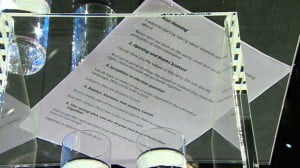To script or not to script?
 Ed Miliband admitted this morn that he omitted two primal sections from his speech to this yr's Labour Party conference in Manchester—one on clearing and the other on the budget arrears. How could he forget such of import sections, when doing practise inevitably leads to ruthless criticism? The answer is simple: he gave a 65-infinitesimal spoken communication without notes, and inevitably that runs the risk of forgetting things. I say 'without notes' rather than 'unscripted', since, equally a flick of his notes (unfortunately face downwardly on the lectern) shows, the slice was in fact carefully planned, fifty-fifty if not fully scripted.
Ed Miliband admitted this morn that he omitted two primal sections from his speech to this yr's Labour Party conference in Manchester—one on clearing and the other on the budget arrears. How could he forget such of import sections, when doing practise inevitably leads to ruthless criticism? The answer is simple: he gave a 65-infinitesimal spoken communication without notes, and inevitably that runs the risk of forgetting things. I say 'without notes' rather than 'unscripted', since, equally a flick of his notes (unfortunately face downwardly on the lectern) shows, the slice was in fact carefully planned, fifty-fifty if not fully scripted.
This raises a question all preachers wrestle with: should I script my sermons or speak off the cuff—or practise something in between? In order to answer this, we need to reflect on the problems and benefits of each approach.
Speaking without a script has become the faddy thing for politicians in the English-speaking world. The revival of rhetoric was kicked off in its well-nigh recent class past Barack Obama, and UK politicians accept been quick to follow his lead, and then combined this with speaking without notes. Perchance the most memorable case was David Cameron's impressive script-free speech communication exterior x Downing Street when he became Prime Minister in 2010. It is worth reading the full text and noting the examples of rhetorical technique—there is almost nothing here which is non said equally role of a 'three', for example. This immediately gives u.s.a. a key link between rhetoric and the question of script: if a speech is memorable , it will be like shooting fish in a barrel for the speaker to memorise. Later on all, if you cannot recollect what you want to say, volition your listeners remember? Preaching is more than giving people memorable audio bites—simply surely we practice want our listeners going away remembering something?
 This then connects with the pedagogy of Jesus. Every bit I accept explored elsewhere, Jesus ofttimes taught in memorable, rhetorically effective, even tightly structured ways which were easy to remember and so easy to repeat. (It is quite hard picturing Jesus speaking from notes—simply people used notes in the get-go century more than than our Hollywood-structure of them often admits, every bit the tablets found at Vindolanda, correct, demonstrate.) The most plausible explanation of the differences between Jesus' teaching style in John and the Synoptics is that Jesus taught in different ways to different people in dissimilar situations on dissimilar occasions. Many of the lengthy discourses recorded in John are in private, to individuals or small groups, whereas the brusque stories and sayings in the Synoptics are in the context of public teaching to the crowds. It is in this latter context that Jesus uses short, pithy apothegms in the 'wisdom' tradition, whilst he clearly taught in a different way in private with the disciples (see the hints of this in Mark 4.ten and elsewhere).
This then connects with the pedagogy of Jesus. Every bit I accept explored elsewhere, Jesus ofttimes taught in memorable, rhetorically effective, even tightly structured ways which were easy to remember and so easy to repeat. (It is quite hard picturing Jesus speaking from notes—simply people used notes in the get-go century more than than our Hollywood-structure of them often admits, every bit the tablets found at Vindolanda, correct, demonstrate.) The most plausible explanation of the differences between Jesus' teaching style in John and the Synoptics is that Jesus taught in different ways to different people in dissimilar situations on dissimilar occasions. Many of the lengthy discourses recorded in John are in private, to individuals or small groups, whereas the brusque stories and sayings in the Synoptics are in the context of public teaching to the crowds. It is in this latter context that Jesus uses short, pithy apothegms in the 'wisdom' tradition, whilst he clearly taught in a different way in private with the disciples (see the hints of this in Mark 4.ten and elsewhere).
And so what does speaking without a text reach? As both Ed Miliband and David Cameron have made clear, it gives a sense of connection, of direct appointment. Cameron highlighted in his speech communication that a key chore for his premiership was 'to rebuild trust in our political organisation', and speaking direct, without a script, seemed to be a first step. For his part, Miliband explained:
He said he preferred non to give pre-prepared speeches as he believed people wanted to hear "direct" from him and it was the "style that worked for him".
"I write a speech and then I get up and apply that every bit a framework for giving a sense to people where I think the land needs to go," he told Radio iv's Today programme.
 From my own listening to the sermons of others, I tin can encounter clearly how much easier it is to engage with the congregation when the preacher is costless from detailed notes. Information technology allows better eye contact; information technology allows for free move, then the preacher can motion abroad from the lectern (if not boxed into a pulpit); and, interestingly, it is much easier to vary and modulate one'southward vocalisation. How we are physically is always reflected in our vocalization, and if nosotros have more freedom to movement, then (often without realising it) we feel more complimentary to vary our pitch, tone and footstep, and and then hold our listeners' attending.
From my own listening to the sermons of others, I tin can encounter clearly how much easier it is to engage with the congregation when the preacher is costless from detailed notes. Information technology allows better eye contact; information technology allows for free move, then the preacher can motion abroad from the lectern (if not boxed into a pulpit); and, interestingly, it is much easier to vary and modulate one'southward vocalisation. How we are physically is always reflected in our vocalization, and if nosotros have more freedom to movement, then (often without realising it) we feel more complimentary to vary our pitch, tone and footstep, and and then hold our listeners' attending.
Then why carp with a script? Hither we come to the Miliband problem: without a script, we won't remember everything. More than than that, we won't exist able to communicate key ideas in memorable ways. I was recently preaching on Romans 6, and near the end wanted to sum up what I had found—what nosotros had discovered together every bit we explored the passage—in the following judgement:
Constabulary is no longer a deadly measuring rod, which shows upwards our inadequacies and condemns united states for our failures. Instead it becomes a life-giving pattern of behaviours into which nosotros are growing by the souvenir and power of God's Spirit.
I felt it was a good, memorable, rhetorically effective summary. So at that bespeak in the sermon I made sure that I came back to my script in gild to get this correct.
What should preachers do in practice, then? I would suggest the following, which I take built into my own practice of preaching:
1. Speak at occasions where y'all demand a full script. One case would be a two-minute 'Pause for Thought' type piece, mayhap on your local radio. Since you have a strictly limited time, yous must script your words very carefully, and it gives the opportunity to craft your words. I learnt an enormous amount past doing 'Pause for Thought' on Radio 2 some years ago, so when teaching preaching I made all students preach a two-minute sermon—and afterwards, many wondered why they needed to preach for longer! When yous craft carefully, you can say a lot in just two minutes.
Other opportunities will exist more formal occasions, peradventure in contexts where y'all are speaking to a larger group or where people do not know you lot well.
2. Discover opportunities to speak with no notes at all. This might not exist the right affair to do in your main Sunday morning service with a baptism and lots of visitors—but you lot might be able to at a wed communion, or an early morning service with a smaller congregation. Where speaking with a script forces you to arts and crafts your words, speaking without a script makes you take a articulate construction, so you (and your listeners) know where yous are going.
iii. As y'all push button the boundaries of your feel at both ends, incorporate this into your regular preaching. Where you have fundamental turning points or summaries, script your words and stick to them. Just in between, where you are offering caption or telling a story, write a summary notation and ad lib. (This is exactly what Ed Milband's notes tell him to practise—see the heading '4. Stories: Xiomara, two women, Gareth'.)
My last suggestion: ever, always, e'er type your notes, nonetheless sparse, rather than handwrite them.
- They volition always be legible, and you can easily enlarge them. (I would guess Miliband's notes are in 20 point).
- They are much easier to file and shop on calculator (as long as yous take a back-up organisation), rather than fiddling with pieces of paper.
- You can always think them, and find something that you said earlier, either to reuse or to avert duplicating.
What are your experiences of using scripts or speaking script-complimentary?
If you have valued this mail, would you considerdonating £1.twenty a month to support the production of this blog?
If you enjoyed this, practise share it on social media (Facebook or Twitter) using the buttons on the left. Follow me on Twitter @psephizo. Similar my page on Facebook.
Much of my piece of work is done on a freelance basis. If you lot have valued this post, yous tin make a unmarried or repeat donation through PayPal:
Comments policy: Good comments that engage with the content of the mail, and share in respectful debate, can add real value. Seek first to understand, so to be understood. Brand the nigh charitable construal of the views of others and seek to learn from their perspectives. Don't view debate as a disharmonize to win; accost the argument rather than tackling the person.
montoyahaversidne.blogspot.com
Source: https://www.psephizo.com/preaching-2/to-script-or-not-to-script/
0 Response to "To script or not to script?"
Post a Comment